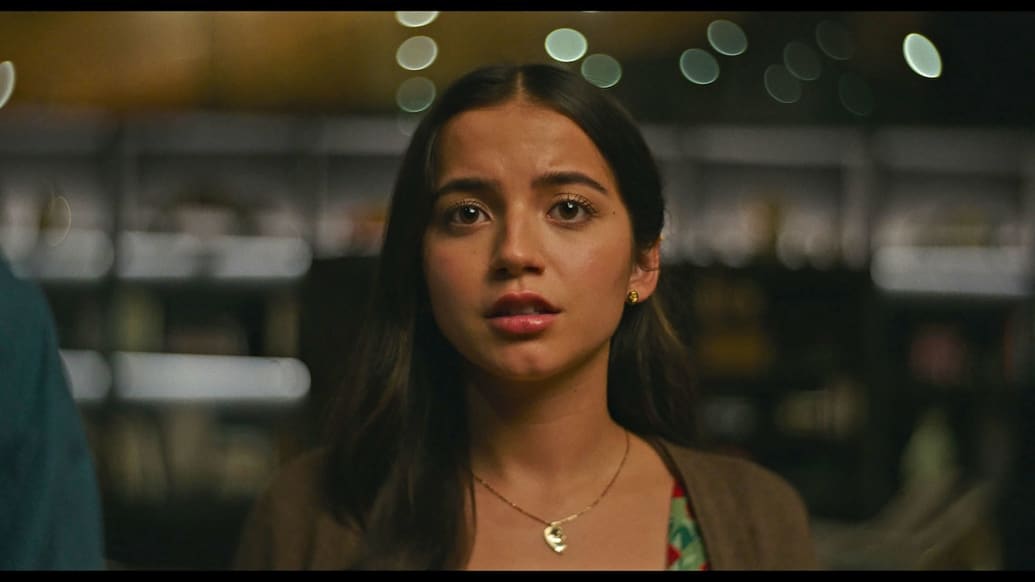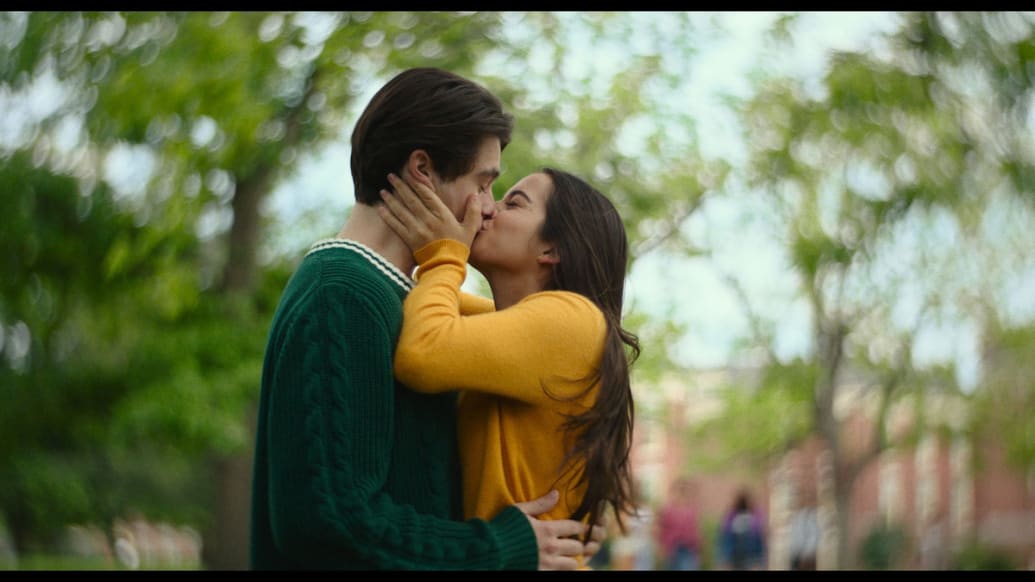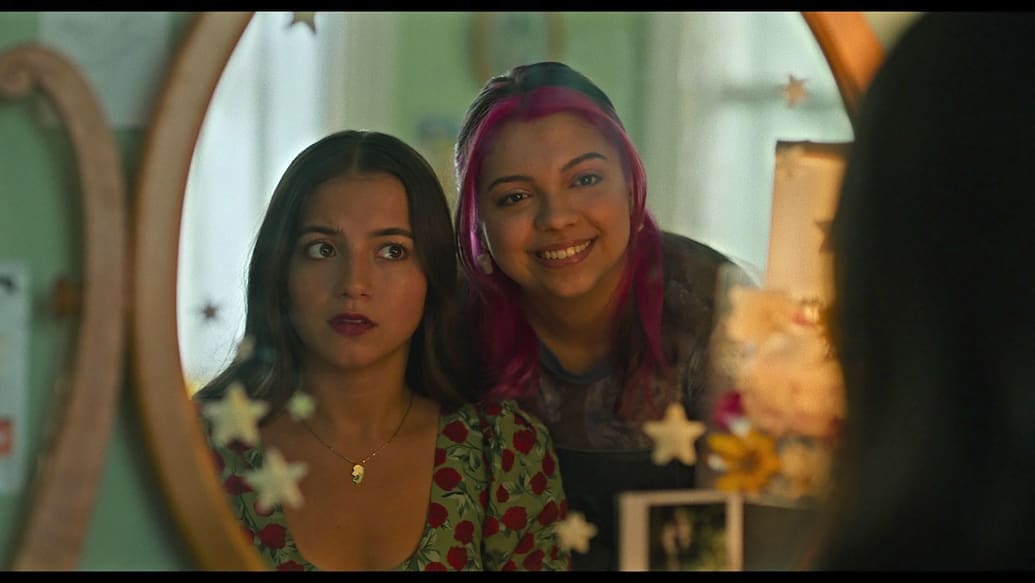You probably haven’t heard of the most important person who worked on Turtles All the Way Down. The adaptation of John Green’s 2017 novel of the same name, which lands on Max May 2, had one VIP star in a key on-set role: Chief Morale Booster. The lucky person (or rather, being) who landed the part? Bonbon, star Isabela Merced’s tiny pet dog.
Bonbon—who is half-chihuahua, half-mini pinscher—is roaming around the HBO offices with Merced while helping to promote Turtles All the Way Down. He’s doing his job as CMB; Merced, Green, and I are all smiles as we kick off our conversation.
“I’ll tell you what—Bonbon is about the best dog in the world,” Green says. “I say that as the owner of the best dog in the world, Potato.”
Unfortunately, neither Bonbon or Potato gets to sit in on our interview. But Potato is there in spirit while Bonbon wags his tail outside. “Bonbon and Potato should be friends,” Merced says. “Is Potato also crippled with anxiety like Bonbon?”
Green nods. “Potato is a very anxious fella, yeah,” he says. “It’s hard to be in our family and not be a little anxious, it’s sort of a necessity for getting admitted into the family.”
It’s not a coincidence, then, that Turtles All the Way Down deals with similar mental health themes. Based on Green’s experience with OCD, the movie follows Aza (Merced), a 17 year old who struggles to maintain relationships with her friend Daisy (Cree Cicchino) and new love interest, Davis (Felix Mallard), while battling intrusive thoughts. Aza is anxious about everything from deathly diseases to missing persons cases in the area.
Some intense scenes proved difficult to film, Green and Merced tell me—there was one day in particular where Green (who also executive produced the film) had to pause from shooting. Bonbon (as well as Merced and everyone else involved) had a big role to fulfill.
Below, Merced and Green discuss what the media gets wrong about OCD and how previous adaptations of Green’s work inspired Turtles.
I don’t know if either of you know this, but fans are really excited about this movie. On social media, they’re like, “John Green cinema is back,” or, “It feels like 2014 all over again!” What’s your reaction to that?
John Green: I mean, I’m good with it! I have no issues with resurrecting 2014 culture. It’s been really lovely to see such a positive response. That’s not down to my work—that’s down to the movie [director] Hannah [Marks] and Bela and Cree and Felix made together. They are so extraordinary that their work made the movie really special.

Isabela Merced: To add to that, I feel like you [John] have this sort of magical ability to make young adults feel seen and heard. It comes with the respect you have with them, which is not necessarily ingrained in our culture. It’s very ingrained in our culture to respect our elders, but I think you talk to everyone like they are just as smart as you, which is such an honor. You don’t dumb it down for anyone. You respect everyone, and for that reason, I think that’s why your projects speak to people so much.
One thing that mega fans love about the book is the purposeful references to The Great Gatsby. Does the movie have any similar connections?
Green: There are a lot of literary references in Turtles All the Way Down, from Gatsby to The Tempest, which was really important to Felix [Mallard] when he was working on the character of Davis. When you’re turning something into a movie—in the same way as when I’m writing a book, I think a lot about my book inspirations—it makes more sense to think about movie inspirations, a lot of times. I don’t know what Bela used or didn’t use, but in general, whatever she did, worked.
Isabela, what about you? What references did you use?
Merced: My music taste informed my performance. I made a playlist for Aza; I like to do that for my characters. I’m not necessarily a journal-er—when it comes to my acting, I can’t write as fast as I think. But one song that I sent to Hannah was “Oh No” by Biig Piig.
Green: Which is in the movie!
No way!
Merced: I was so surprised. I always send my playlists to the directors and am like, “What do you think?” But she actually included it in the film. I feel so honored. It’s one of the things that I’m most excited about.
Green: It’s so good when it’s in the movie, too.
What other artists were on your Aza playlist?
Merced: A lot of Biig Piig. Tame Impala, which is also in the movie. Djo. A lot of funky elements to it, because I think the pops of color in the film are really funky.
I distinctly remember listening to The Fault in Our Stars soundtrack, so it makes sense that music played a huge role in Turtles, too.
Green: We actually had the same music supervisor, Season Kent, that we had on The Fault in Our Stars and Paper Towns. She did a great job. That’s why our soundtrack is so good.

Felix Mallard and Isabela Merced
Max
When the trailer came out, some publications and social media users talked about Aza’s anxiety. Is it important to make it clear that Aza specifically has OCD?
Green: I don’t think the word OCD is ever said in the book, but that’s what I had in mind when I was writing it. So often, when we see portrayals of OCD in movies and in books, it’s either used as a plot device, or it’s romanticized as something that gives you superpowers, the way Sherlock Holmes is very obsessive but also has these wonderful powers of detection. Or it’s stigmatized—you see these behaviors that are treated as “freakish” that people use to manage their anxiety. Really, none of that is my experience of OCD, which I’ve had my whole life. My experience is closer to Aza’s, where a single thought, a single worry, becomes a blinding blizzard of obsessive fear.
In the book, it’s so language-based. I worried that there would be no way to make it visual. But through Hannah’s direction and Bela’s performance, it really becomes profoundly visual. What I didn’t understand was the extent to which Bela can communicate the interior in her face, in the way that she holds her body, and how powerful that is. On some days, it was really quite hard for me to watch. There was one day where I was like, “We should stop.” And everyone was like, “She’s fine. She’s okay.”
Do you remember which scene that was?
Green: Yeah, in the hospital, [when Aza has a mental breakdown].
What was it like for you, Bela, to portray a character with OCD?
Merced: I don’t live with OCD formally. I’m probably undiagnosed with something else. But one thing that a psychiatrist managed to formally diagnose me with was anxiety. [Shrugs] I think that adds up. I feel like you don’t actually need to suffer from these specific illnesses to relate to what John is writing about. Everyone can relate to not knowing their authentic self. Everyone can relate to trains of thought that bombard your psyche in times where you don’t want to. Everyone can relate to zoning out or dissociating when having a conversation, making people that are around you feel unimportant or not prioritized or ignored. For that reason, I know that it will resonate with everyone.
I studied John, in a way, since this is such an important story to him—the way he talks, his idiosyncrasies that make him such a lovable person. That’s part of why everyone loves Aza. How could you not love John?
Exactly!
Green: That’s very sweet, thank you. But lots of people don’t. You should go on the internet some time.
Merced: That’s because they don’t know you! No one could ever make me hate John. I will stand on that.

How do you hope this movie contributes to how OCD is portrayed and perceived, moving forward?
Green: I hope it makes people who are struggling with psychic pain feel less alone and less stigmatized, because it can be quite a stigmatizing thing. I’ve been able to lead a really good and full life—which I have, even though I also have these struggles—because I have wonderful friends who lift me up and I’m able to lift up. I hope that people take away from the movie that our connections to each other are really what allow us to sustain ourselves. For me, it’s two love stories: It’s the love story of Aza and Davis, which is the love story you expect in a movie like this. But then there’s this other love story between Aza and Daisy, that’s really the love story they both need.
Merced: This movie does a really good job at highlighting each relationship that Aza has in her life. This movie is not just for the people who relate to Aza—it’s for the people who have an Aza in their lives. It’s very validating for their experience. When Daisy goes off in the car about how pathologically uncurious Aza—because she’s so invested in her “I, Me” narratives that are part of her intrusive thoughts—that’s really really eye-opening. It’s something that most media portrayals of OCD don’t really mention. It’s allowed me to learn that the whole “I, Me” train of thought isn’t very productive—not just because it’s usually untrue and questionable, but why spend so much time thinking about yourself? I have a much more fulfilling life when I’m more focused on my relationship with others, as opposed to my relationship with myself.
